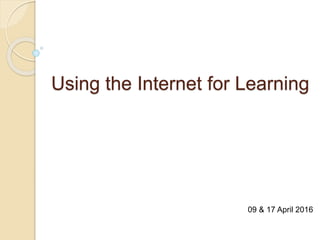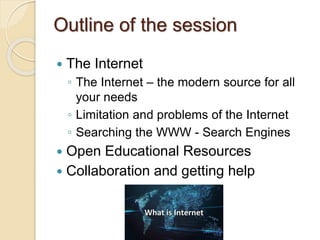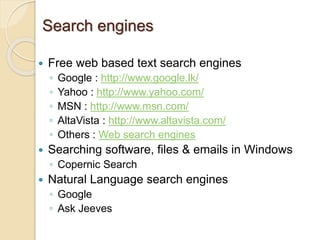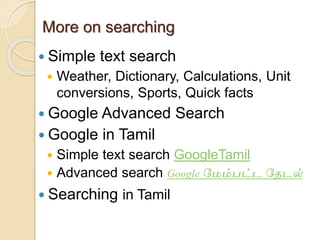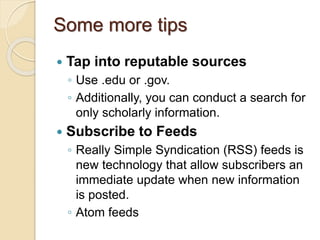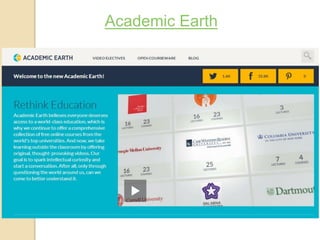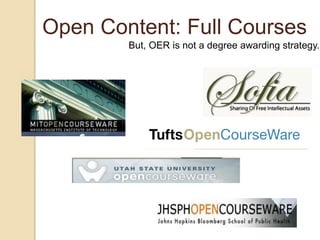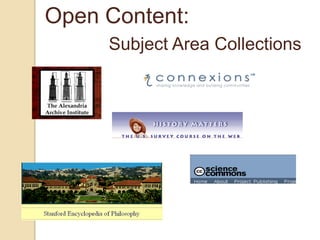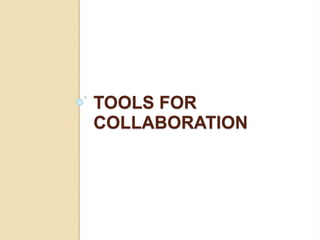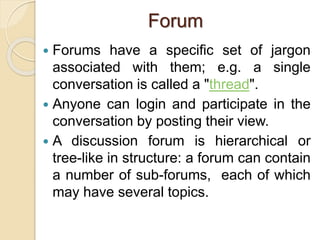Using the Internet for Learning
- 1. Using the Internet for Learning 09 & 17 April 2016
- 2. Outline of the session The Internet ◦ The Internet – the modern source for all your needs ◦ Limitation and problems of the Internet ◦ Searching the WWW - Search Engines Open Educational Resources Collaboration and getting help
- 3. THE INTERNET
- 4. The Internet – the modern source for all your needs What is the Internet – ◦ A global network of interconnected computers that uses the standard Internet protocol suite (TCP IP) to serve billons of users world wide.
- 5. What the Internet offers? Sharing material ◦ World Wide Web: for sharing information in the form of web pages ◦ File sharing – books, documents, pictures, Software, etc ◦ Audio & Video streaming Communication – e-mail, video/voice call, chatting Social interaction – facebook, twitter Collaboration – groups, forums E-learning E-commerce – shopping, banking, booking Controlling and Monitoring -
- 6. The Internet & the other mediums The Internet differs from other mediums primarily in two things: ◦ Immediacy – Any once can access information from anywhere and at any time ◦ Volume - The Internet offers instant access to millions of material on countless topics.
- 7. Pros and Cons about the Internet The Internet is a self- publishing medium, anyone with the necessary technical skills can place information on the Web ◦ Gives freedom for publishing, but also a nuisance if not used unethically
- 8. Pros and Cons about the Internet It has grown into extreme proportion ◦ There is more possibility for an item you wish to refer to be in the Internet, but finding it needs skills. Availability of tools for every need ◦ More possibility to get distracted.
- 10. Evaluating the accuracy & reliability Who published the information ◦ A site maintained by a university or government organization is probably more reliable. Who wrote the information ◦ by a known expert in the field is likely to be reliable.
- 11. Evaluating the accuracy & reliability The age of the material ◦ If you need current statistics, carefully check the age of the material you’ve found. Why the material exists ◦ Many special interest groups have Web pages. Think about whether they might have some reason, other than pure helpfulness, for posting information.
- 12. How to find what you want? Effective searching Knowing the right places ◦ Authorities ◦ University / Open educational resources ◦ Library collections Get help from reliable user group and forums Use the available tools – Calendar, Online forms, Online documents, Save search histories
- 13. Accessing information from the web Directly using a URL Known by heart, from publications, guessing Browsing from a known main page Search engines
- 14. Search engines Free web based text search engines ◦ Google : http://www.google.lk/ ◦ Yahoo : http://www.yahoo.com/ ◦ MSN : http://www.msn.com/ ◦ AltaVista : http://www.altavista.com/ ◦ Others : Web search engines Searching software, files & emails in Windows ◦ Copernic Search Natural Language search engines ◦ Google ◦ Ask Jeeves
- 15. More on searching Simple text search Weather, Dictionary, Calculations, Unit conversions, Sports, Quick facts Google Advanced Search Google in Tamil Simple text search GoogleTamil Advanced search Google மேம்பட்ட மேடல் Searching in Tamil
- 16. Saving web pages for offline use Whole pages can be saved Part of the page; text, table, figure, etc. Whole web site can be saved using software HTTrack Wget
- 17. Best Search engine for Your Need Noodletools – A little outdated, but, still useful ◦ http://www.noodletools.com/debbie/literacie s/information/5locate/adviceengine.html
- 18. Some more tips Tap into reputable sources ◦ Use .edu or .gov. ◦ Additionally, you can conduct a search for only scholarly information. Subscribe to Feeds ◦ Really Simple Syndication (RSS) feeds is new technology that allow subscribers an immediate update when new information is posted. ◦ Atom feeds
- 19. Some more tips Join or Create a Group ◦ A number of websites like Google, Yahoo and MSN offer online groups where members can share information. Understand and Use Boolean Logic or an advanced search ◦ Boolean Logic uses the words “and”, “or” and “not” to create relationships among search terms and allow you to narrow your search. Use Synonyms, Alternate Spellings and Related Topics ◦ For example, if you’re looking for information on dogs, you may also want to search “puppies”, “canines” and “pets”.
- 20. Some more tips Use Different Search Engines Choose a Browser That’s Conducive to Research ◦ Some browsers allow you to add notes, save groups of websites and have integrated search engines that make web research easier and faster.
- 22. Open Educational Resources • Champions the sharing of knowledge worldwide to increase human intellectual capacity. Can develop new resources selecting mixing and editing existing OER List of OER – ◦ http://zaidlearn.blogspot.in/2008/09/101- open-educational-resources.html ◦ OER on Wikipedia 101 Open Educational Resources
- 23. OER Commons
- 24. OCWC Search
- 25. Merlot
- 26. OpenStax CNX
- 27. Open textbooks for K12: Siyavula
- 28. Academic Earth
- 30. University of Minnesota: Open academics textbook catalog
- 31. But, OER is not a degree awarding strategy. Open Content: Full Courses
- 32. Open Content: Full Courses
- 33. Open Content: Library Collections
- 34. Open Content: Library Collections •The Free Library http://www.thefreelibrary.com/ •Perseus Digital Library http://www.perseus.tufts.edu/hopper/coll ections •Documents of Dutch East India Company http://databases.tanap.net/vocrecords/in dex.cfm
- 35. Open Content: Subject Area Collections
- 36. Open Content – Books •Google Books Search http://books.google.com/
- 37. Open Content – Tamil book collections Noolaham Project – www.noolaham.org Madurai Project - http://www.projectmadurai.org/ Noolthettam - http://noolthettam.com/
- 38. Open Content - Data repositories UCI Machine Learning Repository http://archive.ics.uci.edu/ml/datasets.h tml Machine Learning Repository http://mldata.org/
- 40. Tools for collaboration User groups / Forums Blogs Chats Social media …
- 41. Forum An Internet forum, or message board, is an online discussion site where people can hold conversations in the form of posted messages. They differ from chat rooms in that messages are at least temporarily archived. Also, depending on the access level of a user or the forum set-up, a posted message might need to be approved by a moderator before it becomes visible.
- 42. Forum Forums have a specific set of jargon associated with them; e.g. a single conversation is called a "thread". Anyone can login and participate in the conversation by posting their view. A discussion forum is hierarchical or tree-like in structure: a forum can contain a number of sub-forums, each of which may have several topics.
- 43. Forum Depending on the forum's settings, users can be anonymous or have to register with the forum and then subsequently log in in order to post messages. On most forums, users do not have to log in to read existing messages. http://en.wikipedia.org/wiki/Internet_foru m
- 45. Creating you own Forum https://www.phpbb.com/
- 46. Blog Is a Web site, usually maintained by an individual, with regular entries of commentary, descriptions of events, or other material such as graphics or video. Entries are commonly displayed in reverse chronological order. "Blog" can also be used as a verb, meaning to maintain or add content to a blog. Source: http://en.wikipedia.org/wiki/Blog
- 48. Popular Blogs http://dailytekk.com/2012/05/14/100- useful-blogging-tools/ Popular Blogging Tools https://www.blogger.com/ http://wordpress.com http://www.edublogs.org

